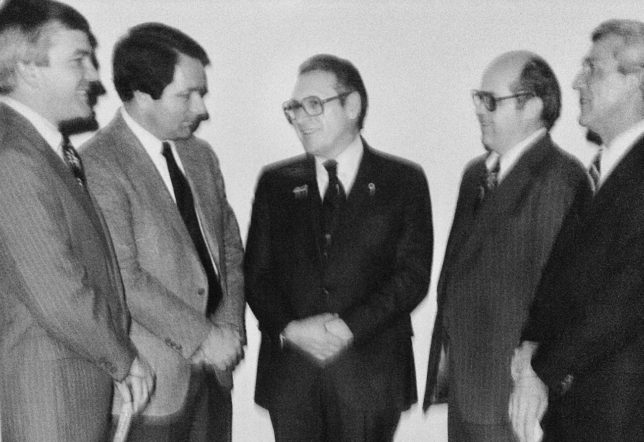Recent events in Washington remind me of how important this is to the success of any leader. See “Sometimes, Aides Save a President From Himself.” Early in my career I always shot straight with my bosses. Later, when I became a leader I always tried to surround myself with people who would tell me what I needed to hear. – CES

The lesson of Paul Corbin was ever on my mind when I returned to the University of Tennessee following the loss in the general election. In my roles – first as executive assistant to the University of Tennessee at Knoxville chancellor and then as executive assistant to the president of the University of Tennessee system – I was always discreet in what I said and did. My lips were sealed on matters of confidentiality, and my ears were always open to words of wisdom. My job, as I saw it, was to ensure that the agenda of the boss I served was executed fully and responsibly. I never pushed my personal agenda nor tried to substitute the wishes of the boss for mine.
Perhaps the most blatant example of a personal agenda taking precedence over institutional loyalty occurred in 1974, early in my administrative career as executive assistant to UT President Ed Boling. It provided me with an important lesson I’ve never forgotten.
The culprit in this case was Roy Nicks, then chancellor of UT at Nashville. Reacting with knee-jerk precision to a totally unexpected decision of a federal judge to order the transfer of academic programs from UT to historically black Tennessee State University, Nicks called President Boling with an urgent request to join him at a called meeting of the UT at Nashville faculty.
Executive Vice President Johnson and I urged Boling not to go to the meeting, primarily because the president had just returned the night before from Europe, and he had not read the judge’s order or been fully briefed on the potential impact of the decision. Boling was not one to run from controversy, and he always had a strong sense of loyalty to the staff that served him. Predictably, the president did not heed our advice, so the three of us immediately flew to Nashville to join Nicks on stage at the faculty meeting.
True to form, Nicks played the role of cheerleader at the event, rallying the troops and vowing to fight the federal judge with every legal weapon available. A faculty still in a state of shock cheered him loudly. Then, inexplicably, he introduced Boling and sat down, not to be heard from again that day.
Although jet-lag weary and essentially unprepared, Boling was (as always) a blunt and tell-it-like-it-is guy. Unlike Nicks, the president explained the seriousness of the court order and made no attempt to voice empty promises or paint rosy futures.
When Boling concluded his brief remarks, Nicks remained in his seat on the stage and left Boling all alone to face the questions. The moment of bitter truth came when an irate faculty member sarcastically asked Boling if he could commit to the faculty that no further court decisions would plague the embattled campus. In words I will never forget, Boling responded, “I can’t give you any commitment.”
It was the only truthful answer anyone could give, but the faculty – fired up by Nicks’s rah-rah speech – reacted emotionally. Some actually booed the president. Through it all, Nicks sat silently, making no effort to rescue the president. On the flight back to Knoxville, Johnson and I were livid, convinced that Boling had been sandbagged by Nicks.
Less than a year later, Nicks moved on to become chancellor of the State Board of Regents, and I was named to succeed him as chancellor of UT Nashville. From day one, I made a vow with my staff that I would never put the president in the position of having to address the UT Nashville faculty on the federal court issue. In my view, that was the chancellor’s responsibility. In the five-plus years I was chancellor, not once did Boling have to go on stage to face the faculty.
The experience I gained and the lessons I learned from my years as executive assistant to Ed Boling were keys to my future success as a CEO. I made certain he had access to the best information available on any issue. Consistently, my briefing memos were objective, presenting all sides to an issue, stating the pros and cons clearly and substantively, and identifying the potential outcomes of each option. There was never any sugar coating in my briefing memos.
The lessons learned from those experiences as a subordinate served me well when I became the boss and had to select staff. I always looked for individuals who would do for me what I believed I had done for my bosses. Everyone who worked for me had two traits in common: the courage to tell it like it was and the discipline to keep confidences. Regrettably, the marketplace offers too few of this type of individual. I was exceedingly fortunate.
-adapted from Journal of a Fast Track Life, Chapter 17, © 2018 Charles E. Smith. All rights reserved.

